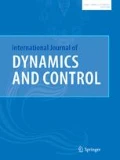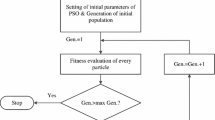Abstract
In this paper, identification and control of a process whose dynamics can be described by a second-order-plus-dead-time (SOPDT) stable/unstable model is presented. Using the state-space approach and limit cycle information, analytical expressions are derived to identify the process dynamics. The wavelet decomposition is performed to recover a noise-free limit cycle output which is generally contaminated by measurement noise. The proportional–integral–derivative controller connected in the feedback loop is designed primarily to get good load disturbance rejection for the identified process. Reference tracking is achieved with the help of a set-point filter. The direct synthesis method with single tuning parameter is used to tune the controller parameters. The best value of the tuning parameter is selected using the particle swarm optimization algorithm in such a way that a good performance measure of the closed-loop system is achieved.














Similar content being viewed by others
References
Liu T, Wang QG, Huang HP (2013) A tutorial review on process identification from step or relay feedback test. J Process Control 23:1597–1623
Åström KJ, Hägglund T (1984) Automatic tuning of simple regulators with specifications on phase and amplitude margins. Automatica 20(5):645–651
Li W, Eskinat E, Luyben WL (1991) An improved autotune identification method. Ind Eng Chem Res 30(7):1530–1541
Vivek S, Chidambaram M (2012) An improved relay auto tuning of PID controllers for critically damped SOPDT systems. Chem Eng Commun 199(11):1437–1462
Huang HP, Jeng JC, Luo KY (2005) Auto-tune system using single-run relay feedback test and model-based controller design. J Process Control 15(6):713–727
Padhy PK, Majhi S (2006) Relay based PI–PD design for stable and unstable FOPDT processes. Comput Chem Eng 30(5):790–796
Majhi S, Atherton DP (1999) Autotuning and controller design for processes with small time delays. IEE Proc Control Theory Appl 146(5):415–425
Lee J, Kim JS, Byeon J, Sung SW, Edgar TF (2011) Relay feedback identification for processes under drift and noisy environments. AIChE 57(7):1809–1816
Panda RC (2006) Estimation of parameters of under-damped second order plus dead time processes using relay feedback. Comput Chem Eng 30:832–837
Majhi S (2007) Relay based identification of processes with time delay. J Process Control 17:93–101
Chen D, Seborg DE (2002) PI/PID controller design based on direct synthesis and disturbance rejection. Ind Eng Chem Res 41:4807–4822
Nema S, Padhy PK (2015) Identification and cuckoo PI–PD controller design for stable and unstable processes. Trans Inst Meas Control 37(6):708–720
Nema S, Padhy PK (2013) PI–PD controller for stable and unstable processes. Int J Syst Control Commun 5(2):156–165
Ajmeri M, Ali A (2015) Direct synthesis based tuning of the parallel control structure for integrating processes. Int J Syst Sci 46(13):2461–2473
Shamsuzzoha M, Lee M (2007) IMC–PID controller design for improved disturbance rejection of time-delayed processes. Ind Eng Chem Res 46(7):2077–2091
Vijayan V, Panda RC (2012) Design of PID controllers in double feedback loops for SISO systems with set-point filters. ISA Trans 51:514–521
Vilanova R, Alfaro VM, Arrietia O (2012) Simple robust autotuning rules for 2-DoF PI controllers. ISA Trans 51(2):30–41
Alfaro VM, Vilanova R (2012) Model-reference robust tuning of 2-DoF PI controllers for first-and second-order plus dead-time controlled processes. J Process Control 22:359–374
Ajmeri M, Ali A (2015) Two degree freedom control scheme for unstable processes with small time delay. ISA Trans 56:308–326
Rao AS, Rao VSR, Chidambaram M (2009) Direct synthesis-based controller design for integrating processes with time delay. J Franklin Inst 346(1):38–56
Mallat S (1989) A theory for multiresolution signal decomposition: the wavelet representation. IEEE Trans Pattern Anal Mach Intell 11(7):674–693
Eberhart R, Kennedy J (1995) A new optimizer using particle swarm theory. In: Proceedings of the sixth international symposium on micro machine and human science, pp 39–43
Vijayan V, Panda RC (2012) Design of a simple setpoint filter for minimizing overshoot for low order processes. ISA Trans 51(2):271–276
Author information
Authors and Affiliations
Corresponding author
Rights and permissions
About this article
Cite this article
Kasi, V.R., Majhi, S. & Gogoi, A.K. Identification and PID tuning techniques for stable and unstable SOPDT processes. Int. J. Dynam. Control 6, 1194–1206 (2018). https://doi.org/10.1007/s40435-017-0362-2
Received:
Revised:
Accepted:
Published:
Issue Date:
DOI: https://doi.org/10.1007/s40435-017-0362-2




